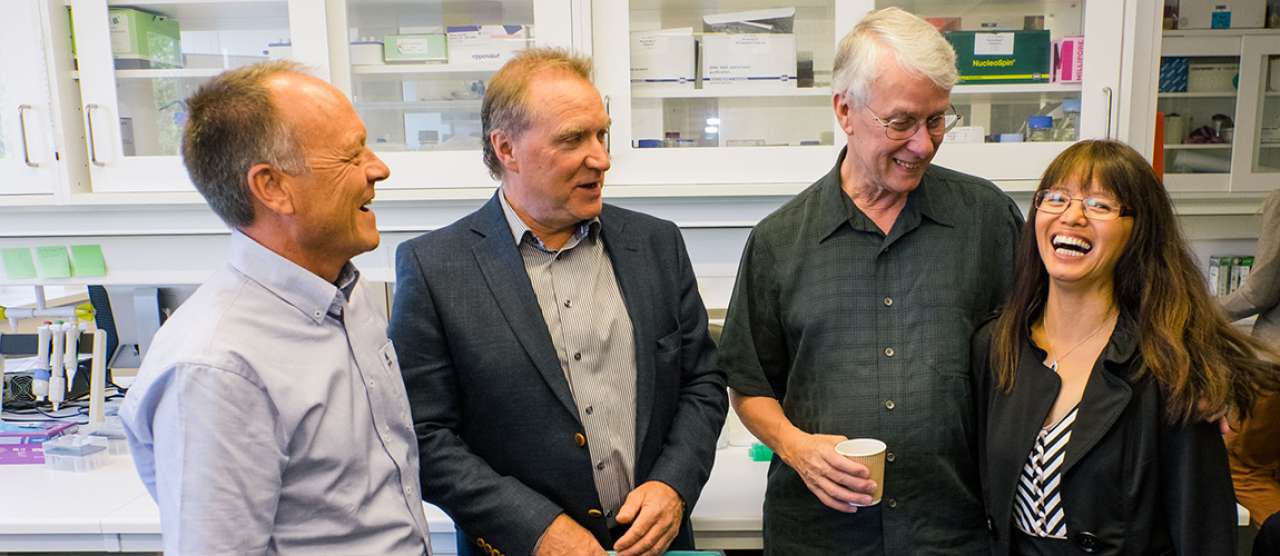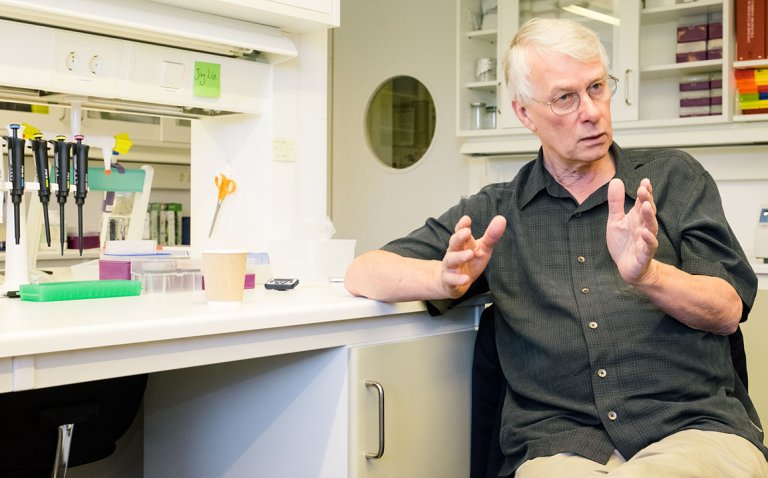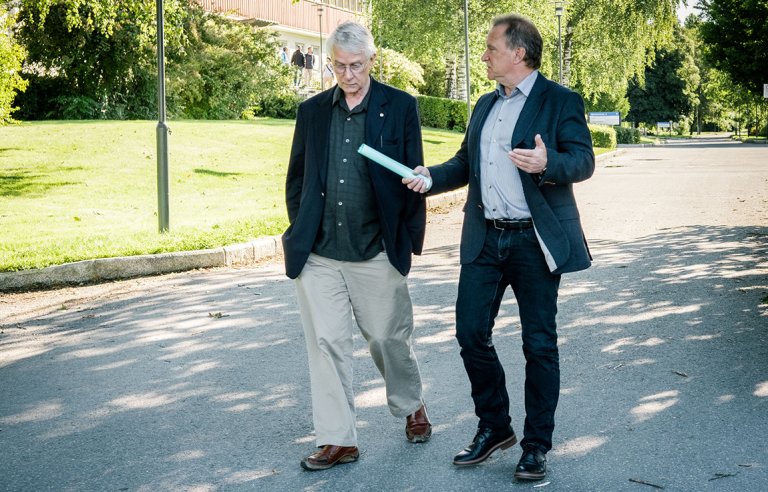Game changing opportunities in biotechnology

From left: Acting director of research at NIBIO Arne Bardal, acting CEO at NIBIO Nils Vagstad, Nobel Laureate Sir Richard J. Roberts and senior researcher Jihong Liu Clarke from NIBIO. Photo: Ragnar Våga Pedersen.
New and awe-inspiring developments in biotechnology could be crucial to the future of both food production and medicine, according to Nobel laureate Sir Richard Roberts , who spoke at a recent biotechnology conference organised by NIBIO in Norway.
Delegates at the one-day Biotechnology for Bioeconomy Conference, organised by Professor Jihong Liu Clarke from the Norwegian Institute of Bioeconomy Research (NIBIO), heard from acclaimed Norwegian and international scientists on different innovations and advancements in biotechnology.
Topics ranged from precision plant breeding using gene editing technology - such as research on how to use tobacco plants to produce vaccines at NIBIO, to industry’s role in bioeconomy - including the journey and ideology of the New England Biolabs where Sir Richard Roberts is the chief scientific officer.
Roberts, a British scientist, was awarded the Nobel Prize in Physiology or Medicine with Phillip Sharp in 1993 for the discovery of introns in eukaryotic DNA and the mechanism of gene splicing.
Crucial technology
The Nobel laureate opened the first conference session by sharing the special history of New England Biolabs, which grew from a small basement enterprise run by idealistic scholars, to a large and important research company offering the greatest selection of recombinant and native enzymes for genomic research. All along, the company's profits have been plowed back into its own research, and the business currently employ several hundred scientists.
Roberts believes there are great opportunities in biotechnology today, which for instance can be utilised to develop a sustainable agriculture sector in the developing world that can feed a fast-growing population. This includes adding useful traits to crops or removing compounds that are not wanted
Medicine is another area where biotechnology is crucial, he says:
- These days, all diabetics get their insulin from bacteria. We don’t go to humans or pigs. Instead, the human insulin gene is put into bacteria.
- There is also interesting work going on with cancer. This is one disease that we have not figured out how to treat properly. Yet the immune systems is often able to take care of it. Most recently, scientists have been taking cancer cells from a patient and then making antibodies against those cancer cells in test tubes outside the body, for then to put them back into the patient. Often you can cure cancer this way, he says.
He emphasises that it is both basic and applied research in combination is needed in order to make new products.
- It is important to realise that it is a combination of doing basic research and finding out how things work – and then doing some engineering to reproduce some of the natural mechanisms in test tubes, that makes new treatments and technologies.
To encourage innovation, however, Roberts says it is necessary to give young scientists a great deal of freedom, to listen to them and not attempt to stop them.
- Young people are creative and have good ideas on how to do things. It is important to make it possible for young people to flourish. When I was young if someone said “don’t do it”, I knew it was something I wanted to do. This is a good thing. Listen to young people and give them the freedom to make the big discoveries!

Damaging fear campaign
Roberts greatest concern for biotechnology is what he calls the “enormous problems” encountered by plant scientists in Europe. This, he says, is due to “fear campaigns” by green parties and environmental groups such as Greenpeace that oppose the development of genetic modification of organisms (GMO) and GM-food. He says this has devastating impact for the third world, where many people are starving and such technology could help build a sustainable food production.
- Europe can feed themselves and can gladly refrain from using GMOs. But do not say that this is dangerous and spread this scaremongering to Africa! For it is not true - this is useful knowledge! There is no evidence that this is dangerous. Rather the opposite – every study done says it is safe. And so much GMO has been consumed by people and animals that we would have found out by now if there were any problems, Roberts emphasises.
The Nobel laureate has recently been an important voice in the international debate surrounding GMOs. He was the initiator behind a letter signed by 109 Nobel laureates to Greenpeace this summer, where they urged the environmental group to rethink its longstanding opposition to GMO. The acclaimed scientists claimed that the anti-GMO campaign is not only wrong and GMO-food is perfectly safe, but that it is harmful to people in the developing world, who could benefit from the technology.
When people get scared it is difficult to reassure them. I think Greenpeace need to apologise and say we got it wrong, Roberts says.
The end product is what matters
According to Sir Roberts, the real issue we should be concerned with is not how you make things - but the product you get at the end.
- It is the end-product that is important - the method is irrelevant. Whether I assemble a car by hand or on a factory floor is not important. It is how the car works.
- When we use traditional plant breeding to mix genes from two plants, we often don’t know what they are and we have no way of knowing if they are dangerous. With the GM-method, we put one gene into the plant - we know what it is, we know where it goes and we can test to see what has happened. So there is a precision with the GMO that you lack in traditional plant breeding, Roberts points out.
More nuanced gene editing
The newest development connected to genetic modification is CRISPR technology (Clustered regularly interspaced short palindromic repeats), named Breakthrough of The Year 2015 by Science magazine. This is a further improvement on the current GMO-technology and was one of the main topics at the Norwegian biotechnology conference.
CRISPR is a genetic engineering tool with the ability to alter the genetic material inside a plant or animal faster, with greater precision and finesse and also cheaper than conventional breeding or genetic engineering. What is so special about CRISPR is that it works equally effectively in all organisms, and you can change many genes simultaneously. This gives unknown opportunities to improve plants and animals in food production.
However, one of the issues that concerns European scientists is how CRISPR-edited plants will be regulated. The EU-legislation, as well as the Norwegian Gene Technology Act regulate products according to what technology they are made with, rather than the product traits. Many believe it will be devastating for science if CRISPR is regulated in the same way as GMO, particularly since the changes made in the laboratory could theoretically have occurred in nature.
Tage Thorstensen, research scientist at NIBIO, uses CRISPR technology to explore the genes of strawberries, and was part of a panel debate on CRISPR at the conference. He said the current legislation in Europe discriminates between technologies:
- They are focusing on technology instead of traits, which they do in the States and which is what they should also do in Europe and in Norway. If they are going to evaluate GMO and CRISPR products case-by-case, this is what they should also do with conventional bred products, as a mutation produced by CRISPR is the same as a mutation produced by mutagenesis, Thorstensen argued.
There are also fears that if there are extensive approval processes and strict regulations in place, this will mean that only large multinational companies have the time and money to develop products using CRISPR for the market.

Time to revise the law
Nils Vagstad, CEO at NIBIO, believes the current Norwegian regulations on genetic engineering needs an update.
- Norway has relatively tight restrictions on genetic engineering. The Norwegian Gene Technology Act is getting old, and this is an area where the development is happening very fast. It is probably time to revise these regulations, Vagstad claims.
He says the institute is very proud to have hosted such a prominent guest as Sir Roberts - and for the Noble laureate to be a participant in central discussions at the seminar.
According to Vagstad, it is crucial for NIBIO to follow and use the latest developments in biotechnology.
- As a forward-thinking institute in such important areas as food production, the environment and bioeconomy, it is essential to have an offensive outlook on technology in general and biotechnology, including genetic engineering overall and more specific methods such as CRISPR.
- Biotechnology generally and various applications and methods within this area, will have a strong focus in NIBIOs research going forward. In this context, we have established various initiatives and programs, where we try to give creative researchers some elbowroom to develop good ideas, the NIBIO-CEO adds.
The Biotechnology for Bioeconomy Conference was sponsored by Campus Ås Inkubator Ås, Innovation Center, Kjeller Innovation and NIBIO

